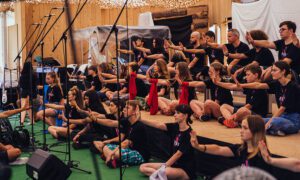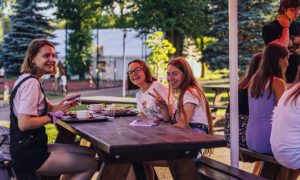August 24, 2021
Beyond Hope
What do you do when you lose the thing you’ve been putting your hope in? For so many of us, the events of this past year and a half have forced us to answer that question. Normal activities were cancelled, school was moved online, people were separated from family, and friends, jobs, and businesses were lost; every day there were stories of more sickness and death. In the face of so much loss, it was easy to feel that things were beyond hope.
When Fusion stopped being able to meet, Emi suddenly found herself alone with a lot of time to think. She started developing anxiety that she was too broken and that her past history of toxic friendships, combined with the distance of quarantine, would be too much for her new friendships from Fusion to endure. As a result, she started withdrawing further into herself. She tried making art and music on her own, escaping into books or tv shows, or just sleeping the day away; unfortunately, her anxiety only grew worse. It got so bad that she could barely function, and she began to feel like she would never be able to fix herself. She felt like she was beyond hope.

The theme of summer camp this year was “Beyond.” Throughout the week, campers heard talks about how Jesus is beyond our fears, failures, doubts, and dreams. This theme (as well as restrictions, fewer leaders, limited time, etc.) inspired our Fusion team to think “beyond” what our normal end of the week concert could look like. We came up with the idea for a creative dance/pantomime drama set to music that would tell the story of some of the feelings teenagers faced during the pandemic—including how to move forward in a positive way.
We settled on the theme of Hope, who was also the main character in our drama. On her journey, Hope encountered other characters like Loneliness, Anger, and Depression—responses we can all have when we lose the thing we’ve been putting our hope in. At first, Hope was reluctant to help because she feared that if she shared her hope (symbolized by a white flower), she will have nothing left. But, when she finally did share her hope, she discovered that she still had hope within her. The hope she shared with one person soon spread throughout the entire stage until everyone was dancing together.

Emi was so excited when she heard the idea for our drama at camp! You see, Emi’s story didn’t end with hopelessness. In fact, she told me at camp that the theme of hope had been so important for her over the past few months.
Earlier this year, Emi realized she couldn’t overcome her anxiety on her own, so she reached out for help. In our weekly meetings, that started out as English/Polish language practice, she started opening up to me about her struggles and her fears. I encouraged her to invite God into those fears through prayer. She reached out to other people who were close to her. She started a regular practice of reading her Bible, praying, and talking about what she was learning. Slowly, she started seeing God clearly answering her prayers for deep, strong friendships. Her faith has been growing ever since. Though she still struggles with anxiety, she knows it doesn’t have control over her life, because she sees now that God is in control.


On her own, Emi felt hopeless. But, when others shared their hope with her—the hope we have in Jesus that is not dependent on circumstances or our own goodness or abilities—her life changed for the better. And now she’s able to share that hope with others.
What if “beyond hope” can have a double meaning? Instead of hopelessness, it’s a hope beyond how things appear. Our hope is in a God whose love and faithfulness is beyond measure and who will one day take all of the darkness and brokenness we see in this world and redeem it into something more beautiful than we can imagine. And it’s our task to share in God’s redemptive work—sharing that hope with a hurting world.





